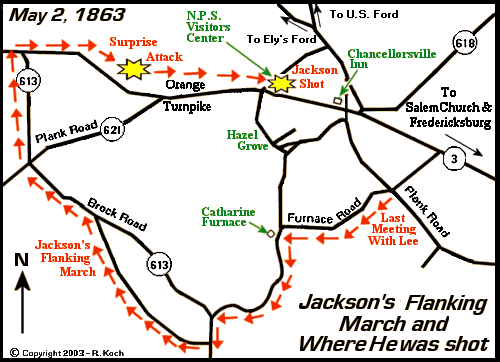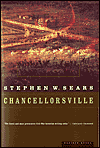May 02, 2006
Gratuitous Civil War Posting
Today is the anniversary of Stonewall Jackson's famed 1863 flanking march during the Battle of Chancellorsville, in which Jackson took his division clear around the Union Army, made a surprise attack against its right flank and ended the day accidentally shot by his own men, dying eight days later from pneumonia.
Here is a map of Jackson's route:

(Image found at this site, which contains many more Civil War maps and photos.)
The Battle of Chancellorsville has been called one of Robert E. Lee's greatest victories. I happen to disagree with this conclusion, believing instead that while Lee made the best of the situation, he was more lucky than anything else.
Following the disastrous Federal attack on the Confederate positions at Fredericksburg in December, 1862, the Union puzzled mighty hard as to how to dislodge Lee from his stronghold. The answer was devised by "Fighting Joe" Hooker, the general who replaced Ambrose Burnsides after Fredericksburg. And indeed, it was a very good one: Hooker would cut off Lee's supply line with a massive cavalry raid (there was only a single rail line leading into Fredericksburg) and, at the same time, quietly decamp, move upstream, cross the Rappahanock and come down on Lee's flank. Hooker reasoned that once he was across, Lee would have no choice but to come out after him. Meanwhile, Hooker would send another force across the river at Fredericksburg to get behind Lee. Caught in this pincer, Lee would be crushed by the firepower of the Federals.
As far as moving his army, Hooker's plan worked brilliantly: he had left his position opposite Fredericksburg and got across the river upstream before Lee even realized he was moving. This was the result of superb administrative organization and a complex ruse de guerre that involved bogus signals, simulated camp life and other measures designed to make it look as if the Union Army was still snuggly in place. Federal military intelligence was handled by Allen Pinkerton. He is notorious to Civil War history buffs because of his wildly inaccurate estimates of enemy strength. But in this matter, he did very well indeed.
Once Lee got wind of the Federal movement, he did indeed come out to face Hooker. Here, I think, is where Lee got lucky: although Hooker's plan was extremely good, the man simply lost his nerve when it came to the actual fight. This started when the Federal raid against Lee's supply-line went awry, Stoneman (the cavalry commander) going off on a wild goosechase. Hooker became convinced that Lee would draw up reenforcements to confront him and, despite the near unanimous wish of his subordinate commanders to the contrary, proceeded to advance east from the river fords in a pokey, hesitant manner.
Jackson's flank march may or may not be seen as the final straw that broke Hooker's resolve. There had been some warning of it, but this was later dismissed and, indeed, Hooker thought Lee might even be retreating. When Stonewall's men crashed into O.O. Howard's 11th Corp late in the day of May 2, the Federals were caught absolutely flat-footed. Dusk and localized Federal resistance eventually absorbed the attack, but not until the Union forces had been pushed back a considerable distance. It was in the confusion that Jackson was shot - while coming back from reconoitering the Federal positions - by men of a North Carolina regiment.
From there on out, Hooker had already lost. He still vastly outnumbered Lee and even after Jackson's attack, could have crushed the Army of Northern Virginia. Indeed, Hooker had three fresh divisions in reserve - those of Meade, Reynolds and Hancock, whose commanders repeated urged him to turn them loose. But Hooker couldn't bring himself to do it. Instead, he consolidated his forces into a near circle protecting the river fords and slowly let himself be pounded to rubble under the Confederate guns.
So as I say, it is certainly true that Lee made the best of his forces in the face of overwhelming odds. But I believe that had he faced a Union commander with more resolve than Hooker, the results would have been considerably different. The Federals could very well have crushed him. Lee wouldn't be praised for his daring, but instead be castigated for splitting his forces and running desparate and needless risks. I suppose that's just the way things work out.
Incidentally, if you're interested in this battle, I would recommend this book:

Chancellorsville by Stephen W. Sears.
It gives a very clear account and is particularly fascinating in its description of Pinkerton's intel ops that set up the battle.
Posted by Robert at May 2, 2006 08:42 AM | TrackBackExcellent post! The point about Hooker is probably correct, though his lack of resolve was likely fortified by Lee's audacity (flank march) and previous experience.
The Union didn't get a resolute commander until Grant, who had not fought Lee prior to their Wilderness engagement a year later and a few miles down the same Plank road central to Chancellorsville.
Posted by: Allan at May 2, 2006 09:10 AMThankee. And you're right to suggest that Lee manufactured his own luck, to some extent. Certainly by this time, after his successes on the Peninsula, at Antietam (in that he got away from McClellan), Second Manassas and Fredericksburg, he had a formidable reputation and it probably spooked a great many more people than just poor Joe Hooker.
Ironically, it might well have been consideration of this that, among other factors, decided Lee to throw his Hail Mary charge on the third day at Gettysburg, where his luck finally turned.
Posted by: Robbo the LB at May 2, 2006 09:28 AMI love Chancellorsville -- it is such a gem of strategy, on both sides. Hooker was no dummy, and his plan was good. Lee's was better, though. Outnumbered 2 to 1, he divides his forces. Just consider the stones that took -- the sheer unmitigated gall. If Lee had lost, consider how bitter the recriminations would have been. Of course, in one sense, Lee was always asked to do the impossible, so he was always playing with house money, so to speak. His luck came to an end at Gettysburg, though. Tough to beat a much bigger army that's dug in on the high ground. He'd have done better to avoid that one.
I think the other problem the Union faced at Chancellorsville was that their army, though big, was still green. More experienced troops wouldn't have been caught flat-footed, or wouldn't have broken the way Howard's men did. The commander's resolve is critical -- consider Grant at Shiloh, or Sheridan at Winchester. Either of them would have pressed on, as would have Reynolds, or Hancock, or Meade.
But consider that McClellan would probably not have attempted what Hooker did, or that Burnside would have probably caused an even bigger defeat. Hooker was marginally more competent as a field commander than either of them. He just wasn't good enough to beat Lee. Meade was just good enough to win at Gettysburg, where everything was in his favor. The Union army is, at this point, getting better. In the West, its winning. Only a matter of time for Lee.
Posted by: The Colossus at May 2, 2006 10:12 AMGreat post! If you want to do a follow-up, Saturday is the anniversary of the Battle of the Wilderness. Which, as you know, had a much different outcome for Lee.
Posted by: The Maximum Leader at May 2, 2006 03:13 PMKnow what I love about the Battle of the Wilderness? The feeling that swept through the Federals after they broke off when they realized that they were still headed south and that finally, here was a commander - Grant - who was not going to give in.
Posted by: Robbo the LB at May 2, 2006 03:27 PMAgreed.
Posted by: The Maximum Leader at May 3, 2006 07:56 AMYou should mention Hooker's other footnote in history: As I recall, he was in charge of the defense of Washington early in the war. Using his powers under martial law, he made all of the "ladies of the evening" work in a certain area in SE or SW Washington. The collection of ladies was commonly referred to as either Hooker's Battalion or Hooker's Brigade, which was eventually shortened to...well, to hooker.
And that, as they say, is the rest of the story.
Posted by: Victor at May 3, 2006 03:24 PMAfter reviewing the casualites of both armies at Chancellorsville, Confederate General Longstreet commented that after two more such Southern "victories," there would no longer be an Army of Virginia, while the Army of Potomac would still have as many troops left as Lee had commanded prior to Chancellorsville. The always sober Longstreet recognized what the "cavaliers" of the Confederacy did not--that the disparity in population and manufacturing capacity between the Union and the Confederacy had in all likelihood spelled defeat for the Confederacy from the time the war began. It was his cold objective analysis that made him skeptical of Lee's post-Chancellorsville plan to invade the North. He initially opposed the plan outright, and went along with it only after extracting a promise from Lee (or so Longstreet thought) to conduct a "defensive offensive campaign" in which the Army of the Virginia would look for good ground, dig in, and provoke a Union attack on their positions. Of course, Lee ignored Longstreet's advice at Gettysburg, asaulted well-entrenched Union positions, and decimated his troops, thereby irrevocably setting the course for the decline and defeat of the Army of Virginia.
Posted by: Ralph at May 3, 2006 06:19 PM

 Image courtesy of the lovely and talented
Image courtesy of the lovely and talented 